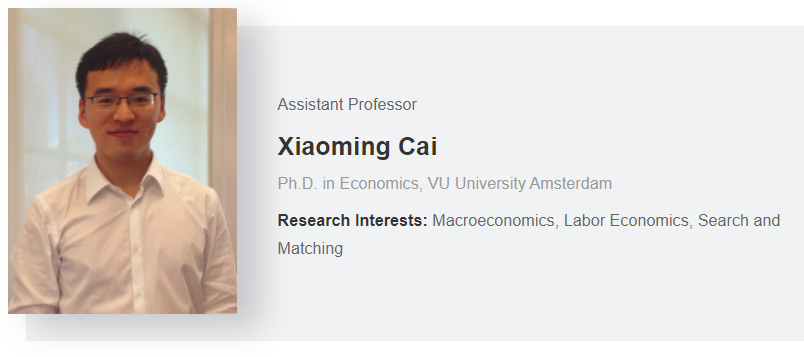In a modern economy, wages are the main income source for most people; hence the average wage level is an important indicator for the labor market. However, it is not the case that the higher the average wage level is the better the labor market functions, because when the wage rate is too high, it leaves companies with too little profits, which then implies less investment and hence less growth in the future.
Thus, when a match is being formed, firms need to anticipate future match separation caused by their employees’ on-the-job search. In “Efficiency of Wage Bargaining with On-the-job Search” published in the International Economic Review, Assistant Professor Cai Xiaoming analyzed how the surplus should be split, when an employed worker finds a new job, so that workers and firms receive their fair share.

Classical economy theory argues that competition in the labor market will ensure that workers get their fair share: if the average wage level is too high, then firms will employ too few workers, which leaves some workers unemployed and who would be willing to accept a lower wage; if the wage level is too low, then firms will open up more vacancies, resulting in some unfilled vacancies and those vacancies would be willing to offer a higher wage. Hence, because of the competition, the equilibrium wage level will be economically efficient.

However, the above simple theory did not capture the key fact that no two workers are the same. When a firm tries to fill its vacancy, it usually takes a lot of time and resources to find the right worker. As the matching process is costly, whenever a firm and a worker overcome the difficulty and decide to form a match there is surplus to be shared. The split depends on the bilateral negotiation and the influence of labor market competition on the worker and the firm is limited. If workers’ bargaining power in this situation is too high, it will leave firms with too little profit, which will lead to less output through the channel of investment. What complicates things even more is that when employed workers search for new jobs, they will typically ignore the impact of their job change on their current employer.
In his recent paper, Cai therefore studies efficiency in a general class of search models where both unemployed and employed workers search for better jobs and can meet multiple firms simultaneously. Employers can respond to outside offers and wages are a weighted average of the productivities of the current employer and a credible poaching firm. The key findings are that the new firm’s contribution to the society is the difference between the worker’s productivities at the two firms; the new firm’s profit should be a fraction of this difference, and the right fraction depends on how firms generally contribute to locating the right workers; it is not necessary for the worker’s current employer to be compensated upon such separation as long as all firms adhere to the abovesharing rule.

